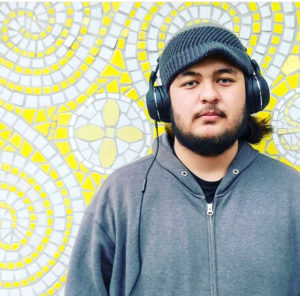In honor of National Mentoring Month, We’Ced sat down with former youth reporter and current mentor Victor Seguin to get his take on what it means to help guide and support young people. From reminders to lend a compassionate ear to the importance of leading by example, Victor’s words of wisdom are a great lesson for both adult allies and youth alike.

We ‘Ced Youth Media mentor Victor Seguin
Q: How would you define the role of a mentor?
A: Someone who helps and supports those who they mentor. Being there for them, and supporting them by helping with any questions or anything else that they need help with.
Q: When was the first time you felt like you had a mentor in your life? What did they do to make you feel you could look at them that way?
A: Junior year of high school. My after school club teacher always helped me when I needed it. It was part of ASSETS [After School Student Education: Teamwork for Success] and I was in anime club as well as drama club. In drama club, the mentor helped with my self-confidence because we had to act out a lot scenes from movies and plays. They were always real encouraging and the opportunity helped to give me the confidence to do stuff in front of people that I never thought I would have been able to.
Q: What are some of the things you learned from your mentor(s)?
A: Respect and responsibility and to keep trying even after I’ve failed.
Q: What aspects of your life would you say your mentor helped with?
A: They helped with my school and personal life. They always made sure I could go to them when I needed help.
Q: What made you want to become a mentor to others?
A: I like to help people and I believe that through mentoring I can do that.
Q: What are some areas you see yourself growing in now that you’re a mentor to others?
A: I feel I’ve become better at socializing as well as being able to manage a small group of people.
Q: What are your goals for yourself as a mentor?
A: To be able to help the people I’m mentoring succeed in their goals with the We’Ced program as well as their goals outside of it.
Q: What are some goals you have for the people you’re a mentor to?
A: For them to be able to be successful in anything they choose to do.
Q: What would you say is the most important lesson to remember when being a mentor?
A: Everyone experiences things and learns things differently and at their own pace.
Q: What’s the most surprising thing you’ve learned since becoming a mentor?
A: Being a mentor has taught me that structure and having a schedule are more important than I had thought before.
Q: Have you seen growth in other areas of your life now that you’re a mentor?
A: Yes. I’m much more comfortable with speaking to people and I’m more willing to volunteer for things now. For example, any of the camps like Sons & Brothers, that I’ve been to are new things that I’ve tried. And, I’m still kind of bad at it, but I’ve gotten more comfortable speaking in front of crowds.
Q: What is something you think is important for people to know about having a mentor or being a mentor for others?
A: If someone is having a rough day you can’t force them to speak to you, but you can make it clear that you’re there for them and they can trust you.
 Translate
Translate
